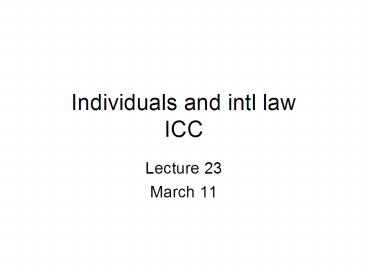Individuals and intl law ICC - PowerPoint PPT Presentation
1 / 14
Title:
Individuals and intl law ICC
Description:
Historically, punishment for war crimes was sporadic and subject to Ad Hoc Decisions ... over war crimes, genocide, and crimes against humanity supplementing the ... – PowerPoint PPT presentation
Number of Views:90
Avg rating:3.0/5.0
Title: Individuals and intl law ICC
1
Individuals and intl lawICC
- Lecture 23
- March 11
2
ASSIGNMENTS-1
- March 13
- International Criminal Law p.395
- http//www.icc-cpi.int/Menus/ICC?lanen-GB
- Rome Statute of the ICC http//www.icc-cpi.int/NR
/rdonlyres/EA9AEFF7-5752-4F84-BE94-0A655EB30E16/0/
Rome_Statute_English.pdf - You need to read Articles 1-21, at least.
- Find out which article states that ICC takes
cases where the state is unwilling or unable to
prosecute - Who are the judges of the ICC -
http//www.icc-cpi.int/Menus/ASP/Elections/Judges/
2009/Alphabeticallisting.htm - MARCH 16 Quiz-3
- Wednesday, April 1 Guest Speaker
- Professor Kanner Terrorism and International
Law - Attendance compulsory
- Today
- International Criminal Law p.395
3
INTERNATIONAL CRIMINAL COURT
- http//www.icc-cpi.int/Menus/ICC
- Rome Statute of the International Criminal Court
- http//www.icc-cpi.int/NR/rdonlyres/EA9AEFF7-5752
-4F84-BE94-A655EB30E16/0/Rome_Statute_English.pdf
- Entered into Force 1 July 2002 in accordance with
Art. 126 of Rome Statute - 60 days after 60
states had become parties to the statute through
ratification or accession - Judges http//www.icc-cpi.int/chambers/judges.htm
l
4
INTERNATIONAL CRIMINAL COURT
- What are the 4 goals advanced by the creations of
an intl criminal ct.? - 1. justice and punishment
- 2. deterrence
- 3. record-keeping
- 4. the progressive development of intl law
5
WHAT YOU WANT TO FOCUS ONKnow the pertinent ICC
Statute articles
- Complimentarity principle - national courts and
ICC - Which crimes are within the jurisdiction of the
ICC? - Who can be brought before the court?
- Jurisdiction of the ICC
- Relationship to UN
- Judges qualifications
- US concerns
- Reservations no reservations may be made
- Opt-out provision for war crimes
- Non-retroactivity
6
History
- Historically, punishment for war crimes was
sporadic and subject to Ad Hoc Decisions - The Twentieth Century was the bloodiest in
recorded history. 174 million people were killed
in genocides and mass murders. Victims' cries for
justice went unanswered by an indifferent world.
7
History (continued)
- In 1998, the Statute of the ICC was adopted when
the United Nations Diplomatic Conference of
Plenipotentiaries on the Establishment of an
International Criminal Court met in Rome - The resulting treaty gave the ICC jurisdiction
over war crimes, genocide, and crimes against
humanity supplementing the domestic/municipal
courts
8
Timeline
- Dec 31, 00- Clinton signs the Rome Statute
- Feb 01- September 01- Minimal US participation
at ICC preparatory committee meetings1,2 - May 6, 02 -Bush Administration notifies the UN
that it recognizes no legal obligations with
regards to the Rome Statute3 See VCLT Art.18. - July 1, 02- The ICC enters into force
- July 12, 02- The US gains a 1 year exemption for
peacekeepers from ICC jurisdiction after
threatening continued Security Council veto of
Bosnian Missions - August 8, 02 - American Service Members
Protection Act in passed into law. - Sep 30, 02 - The EU offers the US a limited
extradition agreement
9
Jurisdiction ratione temporis
- Art. 11 of Rome Statute
- 1. The Court has jurisdiction only with
respect to crimes committed after the entry into
force of this Statute. - 2. If a State becomes a Party to this
Statute after its entry into force, the Court may
exercise its jurisdiction only with respect to
crimes committed after the entry into force of
this Statute for that State, unless that State
has made a declaration under article 12,
paragraph 3.
10
Ratification of the ICC
- 108 States have Ratified
- Canada
- Most EU member States
- 30 are African Countries, 14 are from Asia, 16
are from Eastern Europe, 23 are from Latin
America and the Caribbean, and 25 are from
Western Europe and other states.
- Countries that have not
- U.S
- China
- India
- Russia
- Qatar,
- Yemen
- Israel
- Iraq
11
- US Opposition to the ICC - Concerns
- The Effect of the Court on the U.S. military
personnel, its commanders, and its operations - The threat that it conflicts/ overrides the U.S
Constitution. Specifically the Bill of Rights
(ICC has not jury) - Unchecked power of the prosecutor
- U.S. has less control of ICC vs. ad hoc tribunals
set up by UNSC.
12
Arguments for the U.S. joining the ICC
- It does not violate the U.S. Constitution
- The accused individuals have extensive due
process rights many of which were secured through
efforts of U.S. negotiators - The Prosecutor has to get authorization from the
Pre-Trial Chamber before s/he commences an
investigation
13
Rights found in both U.S. Constitution and Rome
Statute
- Presumption of innocence (Rome Statute Art. 66)
- Right to counsel (Art. 67)
- Right to present evidence and to confront
witnesses (Article 69(3)) - Right to remain silent (Art. 55(2)(b))
- Right to be present at trial (Art.63)
- Right to have charges proved beyond a reasonable
doubt (Art.66(3)) - Protection against double jeopardy (Art. 17)
14
Right to trial by jury
- This is the only right missing from the ICC
statute. - However, U.S. has already accepted that its
citizens will not get juries when accused of a
crime in Japan or France, etc.































